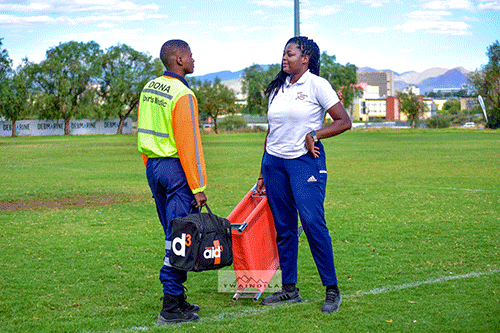Thanks for taking the time to chat with us. Take us through your
journey; how did you get into sports medicine?
I play basketball for Unam Sparks as an extra-curricular activity. My passion for sports has always been unmatched, which gives me the desire to help athletes perform at their best. Sports injuries have always been the ultimate setback of almost all athletes – and given my passion to see others succeed and perform to their maximum, it was natural for me to become a paramedic.
It gives me an opportunity to help people recover from injuries and get back to doing
the things they love the most. This is incredibly rewarding, as it allows me to make a difference in people’s lives.
What particularly inspired you to pursue a career in sports medicine?
I am a qualified Paramedic [ILS] – and since I have been an athlete for most of my life, it was always going to be a natural progression into that space. But I have had the distinct honour and opportunity to learn and grow with my mentor, Donata Ngunovandu. She is the best in that space, and I got an opportunity to learn from her. She’s the only one in Namibia who majored in sports medicine.
Which would you say have been the most challenging sports injury cases you have had to deal with?
Working with athletes from diverse backgrounds is one of the biggest challenges – and to overcome such challenges, one needs to develop cultural competence, learn to communicate effectively with athletes from different backgrounds and tailor
their treatment plans to meet each athlete’s unique needs.
The pressure to get injured athletes back in the game is also another huge challenge – and one has to always remain patient and focus on the long-term health and well-being of the athlete and make decisions based on the best available evidence. Also, when dealing
with high-stress situations, one must remain calm and focused, and prepare for any situation by engaging in regular training and simulation exercises.
What are some of the most common injuries in sports, and how do you deal with them?
Sprains, strains and cramps are among the most common sports injuries. Treatment typically involves rest, ice, compression and elevation (RICE) to reduce pain and swelling. In some cases, physical therapy or surgery may be necessary.
From your perspective, how important are sports medics in the world of sports?
Sports medics are very crucial in the world
of sports. They help ensure the safety and
well-being of athletes, promote injury prevention, facilitate injury recovery and promote overall health and wellness. It gives athletes the confidence to perform in their best capacity, knowing there is aid available. Without sports medics, the health and safety of athletes would be at risk, and the sports industry would not be as successful.
Dealing with injuries is another aspect, but how do sports medics ensure athletes prevent unwanted injuries?
By developing injury prevention programmes, providing education and resources, collaborating with coaches and sports staff, and monitoring and treating injuries, sports medics help to keep athletes safe and healthy, allowing them to perform at their best.
How are these injury prevention and management plans drafted?
By assessing sport-specific risks, conducting pre-participation exams, developing individualised injury prevention plans, working with coaches to implement those plans, developing injury management plans, and providing ongoing education and support.
How do you stay up to date with the latest in the ever-evolving world of sports medicine?
Staying up to date with the latest research and trends is crucial for providing the best care possible to athletes by attending conferences and seminars, reading academic journals, participating in professional associations and collaborating with colleagues. My zali (Donata) always gives us exercises and scenarios to learn critical thinking – and using social media, that is how I stay informed and prepared to provide high-quality care.
Can you describe a typical day in the life of a sports medic?
It basically revolves around examining injured athletes, advising on treatment plans and determining readiness for competition. Also, supervising the rehabilitation of injured athletes and prescribing medication for the treatment of athletic injuries.
What advice do you have for someone interested in pursuing a career in sports medicine?
I would say they must pursue an undergraduate degree in a related field, such as kinesiology, exercise science or athletic training. Seek out opportunities to gain practical experience in the field and reach for the stars.
What specific qualifications and skills are required to become a sports medic?
I would advise a degree in medicine and a foundation course in general training, which takes up to two years, will be a great start. With a degree in kinesiology, some people enter the workforce as exercise physiologists or corporate wellness directors, while others continue their education in physical therapy, athletic training or paramedics. Medical training and knowledge in sports are the skills required.
Do you think the Namibian sports fraternity has fully embraced the important role sports medics play?
Overall, the sports community in Namibia slightly recognises the role of sports medics, especially at minor sports events. The only problem is the lack of knowledge of how sports medicine is highly beneficial.
Thus, raising awareness of the role of sports medics through educational campaigns, community events and public speaking engagements can help people understand
the importance of the work that sports medicine professionals do.
Once again, thanks for talking to us…
You are most welcome.


